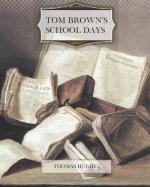“Well, they are not hard workers, and very thoughtless and full of spirits; but I can’t help liking them. I think they are sound, good fellows at the bottom.”
“I’m glad of it. I think so too: But they make me very uneasy. They are taking the lead a good deal amongst the fags in my house, for they are very active, bold fellows. I should be sorry to lose them, but I shan’t let them stay if I don’t see them gaining character and manliness. In another year they may do great harm to all the younger boys.”
“Oh, I hope you won’t send them away,” pleaded their master.
“Not if I can help it. But now I never feel sure, after any half-holiday, that I shan’t have to flog one of them next morning, for some foolish, thoughtless scrape. I quite dread seeing either of them.”
They were both silent for a minute. Presently the Doctor began again:—
“They don’t feel that they have any duty or work to do in the school, and how is one to make them feel it?”
“I think if either of them had some little boy to take care of, it would steady them. Brown is the most reckless of the two, I should say. East wouldn’t get into so many scrapes without him.”
“Well,” said the Doctor, with something like a sigh, “I’ll think of it.” And they went on to talk of other subjects.
PART II.
“I [hold] it truth,
with him who sings,
To one clear harp in
divers tones,
That men may rise on
stepping-stones
Of their dead selves
to higher things.”
—Tennyson.
CHAPTER I—HOW THE TIDE TURNED.
“Once to every man and nation comes the moment to decide, In the strife of Truth with Falsehood, for the good or evil side. . . . . Then it is the brave man chooses, while the coward stands aside, Doubting in his abject spirit, till his Lord is crucified.” —Lowell.
The turning-point in our hero’s school career had now come, and the manner of it was as follows. On the evening of the first day of the next half-year, Tom, East, and another School-house boy, who had just been dropped at the Spread Eagle by the old Regulator, rushed into the matron’s room in high spirits, such as all real boys are in when they first get back, however fond they may be of home.
“Well, Mrs. Wixie,” shouted one, seizing on the methodical, active, little dark-eyed woman, who was busy stowing away the linen of the boys who had already arrived into their several pigeon-holes, “here we are again, you see, as jolly as ever. Let us help you put the things away.”
“And, Mary,” cried another (she was called indifferently by either name), “who’s come back? Has the Doctor made old Jones leave? How many new boys are there?”
“Am I and East to have Gray’s study? You know you promised to get it for us if you could,” shouted Tom.




